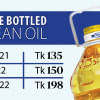Edible oil price shock may soften as Indonesia resumes export

Indonesia, the world's biggest supplier of edible oils, has decided to lift the ban on palm oil exports, a development that is expected to bring much-needed relief to the consumers in Bangladesh struggling to afford the cooking oil because of skyrocketing prices.
Palm oil exports can resume from May 23, Indonesian President Joko Widodo said in an online briefing yesterday.
The decision came after taking into account the improvements in the local supply and prices in the Southeast Asian nation, as well as the 17 million workers employed in the Indonesian palm oil industry.
On April 28, Indonesia halted shipments of crude palm oil and some of its derivative products to control soaring prices in the domestic market, rattling global vegetable oil markets.
The move had an immediate impact on Bangladesh as about 60 per cent of the cooking oil used in the country's kitchens is palm oil, 80 per cent of which comes from Indonesia.
The supply crunch forced the government to increase the prices of the bottled soybean oil by Tk 38 per litre to Tk 198, loose soybean oil to Tk 180 per litre and palm oil to Tk 172 per litre on May 6.
Yesterday, importers and traders say that the move to withdraw the export restriction will bring much-needed relief to the global market as well as Bangladesh.
Speculation that Indonesia will soon withdraw the ban was doing the rounds. As a result, the price of palm oil has been declining in the international market for the last two weeks.
At the Khatunganj market, the largest wholesale hub in Bangladesh, palm oil was selling at Tk 144-145 per little at the wholesale level yesterday, down from Tk 147-148 a day ago and at Tk 154-155 a week ago.
Similarly, soybean oil price stood at Tk 172-173 per litre, slightly down from Tk 174-175 on the previous day, said a wholesaler.
Abul Hashem, a wholesaler in Khatunganj, said the fall in the price of edible oil is being felt in the domestic market in Bangladesh. The impacts will be further visible thanks to the withdrawal of Indonesia's export ban.
He thinks the price will go down further in the next few days as the businesses that have bought and stocked the supply order slips have begun releasing the cooking oil into the market.
The retail market is yet to see any immediate change despite the drop in the wholesale rate. As a result, cooking oils are being sold at the previous rates.
Loose palm oil was selling at Tk 172-182 per litre yesterday and palm oil (super) was retailing at Tk 180-190 per litre, according to the Trading Corporation of Bangladesh.
Rafiqul Islam, the owner of Bismillah Store at the Hamzarbagh Kitchen Market in the port city, said: "We have to sell cooking oil at the previous price as we bought them a week ago."
Palm oil is being sold at Tk 170-170 a litre and soybean oil at Tk 180.
Tapan Kanti Ghosh, senior secretary of the commerce ministry, said: "It is very good news for us. Indonesia is the biggest source of palm oil and lifting of the ban will increase the availability of edible oil in the domestic market."
"Those who are holding the vegetable oil are likely to release their stocks. There will be some effect on prices. But it may take 15-20 days to see the full impact."
He said the main users of palm oil is the food-processing and cosmetics industries and there will be a positive impact on these sectors as well.
According to the senior secretary, the commerce ministry will review the prices of edible oil every 15 days.
"We will do the revision just after the fresh arrival of palm oil from Indonesia. Even before, we will also examine the scope."
Ghulam Rahman, president of the Consumers Association of Bangladesh (CAB), also welcomed the development.
"This will reduce the tendency of increasing prices by businesses who were taking advantage of the situation."
He expects businesses will cut prices and the government will do the downward adjustment of prices.
SM Nazar Hossain, vice-president of the CAB, says unless the government re-fixes the prices, it will not have an impact at the retail level and consumers will not benefit.
"We are saved since we have been suffering from the higher prices of edible oil since the ban," said Syed Nurul Islam, chairman of Well Group, which runs a bakery chain.
According to the entrepreneur, palm oil is one of the main ingredients in bakery, biscuits and the food industry.
According to the National Board of Revenue, more than 13.68 lakh tonnes of palm oil and soybean oil worth Tk 16,119 crore were imported in the four months to April.

 For all latest news, follow The Daily Star's Google News channel.
For all latest news, follow The Daily Star's Google News channel. 







Comments